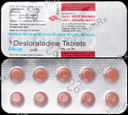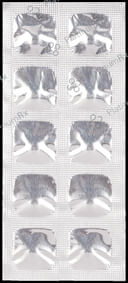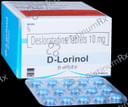Desloratadine
Uses
Desloratadine is used in the treatment of allergic eye disease, nasal allergy symptoms, allergic conditions, sneezing, and runny nose due to allergies, as well as allergic skin conditions.
How it Works
Desloratadine is an antihistamine medication that treats allergy symptoms such as itching, swelling, and rashes by blocking the effects of a chemical messenger, histamine, in the body.
Side Effects
Common side effects of Desloratadine include sleepiness, fatigue, headache, dryness in the mouth, pain during periods, muscle pain, and pharyngitis.
Expert Advice
- Your doctor has prescribed Desloratadine to help relieve allergy symptoms such as itching, swelling, and rashes.
- Compared to other similar medications, it is much less likely to cause drowsiness.
- Exercise caution while driving or performing tasks that require concentration, as it can cause dizziness and sleepiness.
- Avoid consuming alcohol while taking this medication, as it may increase drowsiness.
- Discontinue Desloratadine at least three days before undergoing an allergy test, as it may affect the test results.
Other Combinations
Desloratadine + Montelukast
Ambroxol + Desloratadine + Guaifenesin + Menthol
Ambroxol + Desloratadine + Paracetamol (Acetaminophen) + Phenylephrine + Zinc (Elemental Zinc)
Ambroxol + Desloratadine + Phenylephrine
Desloratadine + Pseudoephedrine
Acebrophylline + Desloratadine + Montelukast
Related Medications
Desloratadine 5mg

₹27.9
₹43
MRP ₹107.5
Desloratadine 5mg

₹59
₹43
MRP ₹107.5
Desloratadine 5mg

₹93.3
₹43
MRP ₹107.5
Desloratadine 5mg

₹38
₹43
MRP ₹107.5
Desloratadine 5mg

₹60
₹43
MRP ₹107.5
Desloratadine 5mg

₹45
₹43
MRP ₹107.5
Desloratadine 5mg

₹92
₹43
MRP ₹107.5
Desloratadine 5mg

₹70
₹43
MRP ₹107.5
Desloratadine 5mg

₹54.5
₹43
MRP ₹107.5
Desloratadine 5mg

₹50
₹43
MRP ₹107.5
Desloratadine 5mg

₹45
₹43
MRP ₹107.5
Desloratadine 5mg

₹64
₹43
MRP ₹107.5
Desloratadine 5mg

₹65
₹43
MRP ₹107.5
Desloratadine 5mg

₹76
₹43
MRP ₹107.5
Desloratadine 5mg

₹50
₹43
MRP ₹107.5
Desloratadine 5mg

₹70
₹43
MRP ₹107.5
Desloratadine 5mg

₹35
₹43
MRP ₹107.5
Desloratadine 5mg

₹52
₹43
MRP ₹107.5
Desloratadine 5mg
₹43
MRP ₹107.5
Desloratadine 5mg

₹33.7
₹43
MRP ₹107.5
Desloratadine 5mg

₹49.9
₹43
MRP ₹107.5
Desloratadine 5mg

₹162.2
₹43
MRP ₹107.5
Desloratadine 5mg

₹36
₹43
MRP ₹107.5
Desloratadine 10mg

₹85.3
MRP ₹104
Desloratadine 10mg

₹117.2

₹85.3
MRP ₹104
Flat ₹100 off on first app order | Use Code: APP100 |
Flat ₹100 off on first app order
USE CODE: APP100

Download Now